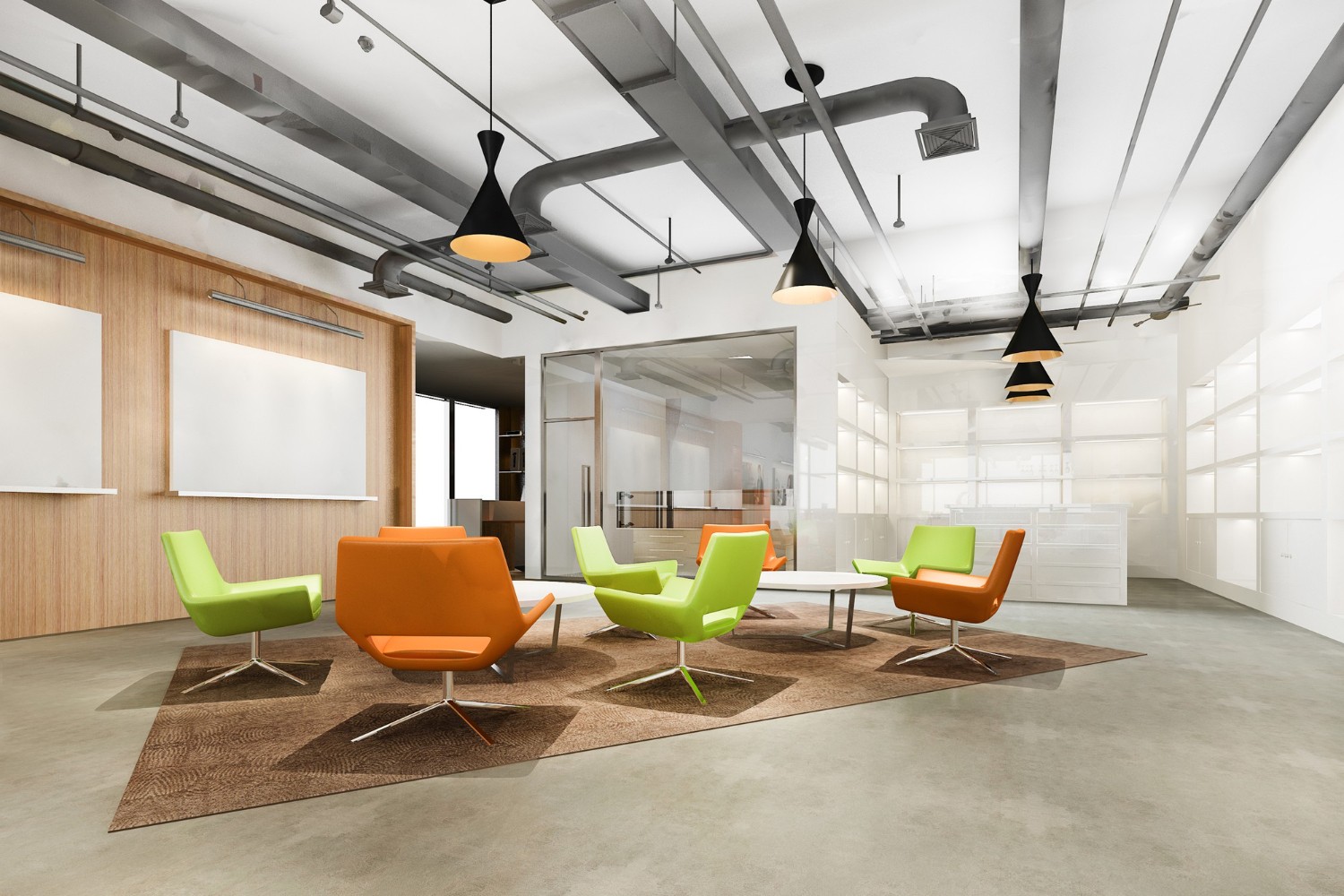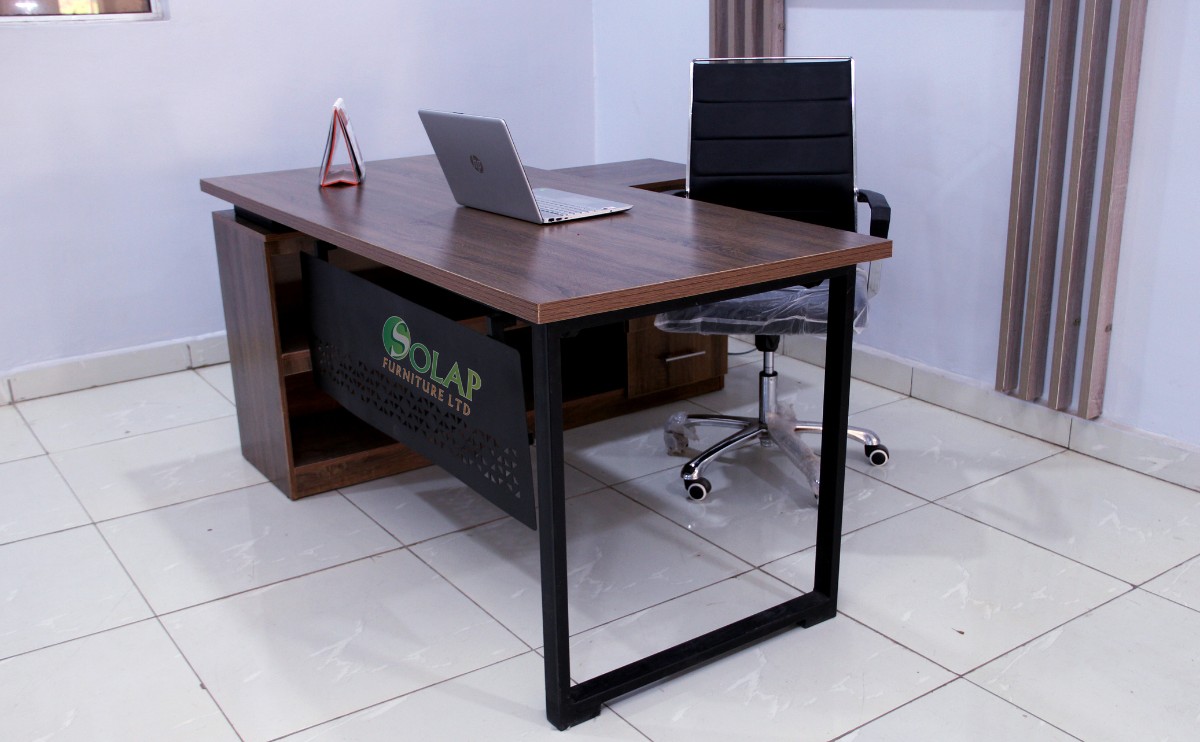Picture this: You step into a freshly renovated office in Abuja. The desks shine, the chairs look sleek and comfortable, and everything feels brand-new and stylish. But fast-forward a few months—the cheap particleboard starts chipping, the “leather” peels under the harsh sun, and those once-cool chairs are now creaky and unstable. That initial wow factor? Gone. Now it just feels like wasted money.
Sound familiar? Too many Nigerian businesses get stuck in this cycle—buying low-quality furniture, watching it fall apart, then spending more to replace it. But what if your office furniture could last, while also being kinder to the planet?
That’s where sustainable office design comes in. It’s not just a global trend; it’s a smarter way to build workspaces. By choosing durable, eco-friendly furniture (like SOLAP’s designs), you save money in the long run, reduce waste, and create a healthier environment for your team.
The best part? It’s no longer a luxury—it’s a smart business move. Isn’t it time your office made the shift?
Beyond Aesthetics: The Sustainable Side of Office Furniture (and SOLAP Furniture’s Role)
Sustainable office furniture goes beyond just looking “natural” or being made from bamboo (though that can be part of it!). It encompasses a range of considerations throughout the furniture’s lifecycle:
● Sustainable Materials: Utilizing recycled content (like reclaimed wood or recycled plastics), sustainably harvested wood with certifications like FSC (Forest Stewardship Council), and low-VOC (volatile organic compound) finishes. Brands like SOLAP Furniture prioritize locally sourced, durable materials, reducing transportation emissions and supporting the local economy.
● Durability and Longevity: Investing in high-quality, well-designed furniture that is built to last reduces the need for frequent replacements, minimizing waste and the embodied energy of manufacturing new items. SOLAP Furniture’s commitment to quality craftsmanship contributes significantly to this aspect.
● Circular Economy Principles: Designing furniture for disassembly and recyclability at the end of its life, ensuring that valuable materials can be recovered and reused. While this is a growing area, forward-thinking manufacturers like SOLAP Furniture are exploring modular designs and material transparency to facilitate this in the future.
● Ethical Manufacturing: Ensuring fair labor practices and minimizing the environmental impact of the manufacturing process, including energy and water consumption. Choosing local manufacturers like SOLAP offers greater transparency into these practices within the Nigerian context.
● Reduced Packaging: Minimizing the use of excessive and non-recyclable packaging materials during transportation.
Why Sustainable Furniture Choices (and SOLAP) Matter for Nigerian Organizations:
Choosing sustainable office furniture, potentially from a local manufacturer like SOLAP, offers a multitude of benefits relevant to the Nigerian context:
● Long-Term Cost Savings: While the initial investment in quality, sustainable furniture might be slightly higher, its durability significantly reduces replacement costs over time. Think of it as investing in furniture that can withstand the rigors of daily office life and the Nigerian climate.
● Reduced Environmental Impact: By choosing furniture made from sustainable materials and manufactured responsibly, organizations can minimize their carbon footprint and contribute to a healthier environment.
● Enhanced Employee Well-being and Productivity: Ergonomically designed furniture made from non-toxic materials contributes to a healthier and more comfortable workspace, boosting employee morale and productivity. SOLAP’s focus on design and functionality considers these aspects. A Harvard study found that better workspace design (including furniture) can increase productivity by up to 16% (source: Harvard Business Review).
● Support for the Local Economy: Choosing Nigerian manufacturers like SOLAP Furniture directly supports local businesses, creates jobs, and strengthens the national economy.
● Improved Brand Image, Reputation and Global Relevance: Demonstrating a commitment to sustainability through thoughtful furniture choices enhances your organization’s reputation and appeals to environmentally conscious clients and employees. In an age where ESG (Environmental, Social, and Governance) standards influence investor decisions, businesses with sustainable offices are more appealing to both partners and talent. A Nielsen report found that 73% of consumers would switch brands to support sustainability (source: NielsenIQ).
● Circular Economy – Many sustainable brands offer buy-back programs, refurbishing old furniture instead of discarding it.
How Nigerian Businesses Are Embracing the Shift
● Sterling Bank’s Head Office, popularly called “The One Customer Place,” features energy-saving LED lighting, water conservation systems, and green spaces—pioneering eco-conscious corporate design in Lagos.
● Solap Furniture Limited, an indigenous manufacturer, is driving sustainable workspace furniture using responsibly sourced materials and eco-conscious design principles.
Is Your Organization Furnished for the Future?
● Lifespan of Current Furniture: How often are you replacing office furniture? What are the primary reasons for replacement (wear and tear, outdated style, poor quality)?
● Material Sourcing: Do you know where your current office furniture comes from and what materials it’s made of? Are they sustainable?
● Durability and Quality: Is your current furniture built to last in the Nigerian climate and under daily use?
● Local Options: Are you exploring local furniture manufacturers like SOLAP Furniture that might offer sustainable and durable solutions?
● End-of-Life Considerations: What happens to your old office furniture when it’s no longer usable? Is there a plan for responsible disposal or recycling?
Taking the First Step with Furniture Choices:
Integrating sustainable practices into your furniture procurement doesn’t have to be daunting. Consider these initial steps, keeping SOLAP Furniture in mind as a potential local partner:
● Prioritize Durability and Quality: Invest in furniture that is built to last, reducing the need for frequent replacements. Explore the quality and craftsmanship offered by manufacturers like SOLAP.
● Inquire About Materials: When sourcing new furniture, ask about the materials used and their sustainability certifications (e.g., FSC). Inquire about SOLAP’s material sourcing practices.
● Consider Ergonomics: Choose furniture that supports employee comfort and well-being, potentially improving productivity. Explore the ergonomic offerings of SOLAP Furniture.
● Explore Local Options: Support Nigerian manufacturers like SOLAP Furniture, who have a better understanding of the local climate and can offer more sustainable supply chains.
● Plan for End-of-Life: Consider how your old furniture will be disposed of or recycled. Some manufacturers, including SOLAP in the future, may offer take-back or recycling programs.
The Future of Office Design
As organizations rethink their workspaces, integrating sustainable furniture is becoming more than a trend—it’s a necessity. Meanwhile, reports from the World Green Building Council highlight how eco-conscious workplaces increase productivity and attract socially responsible employees. The furniture we choose for our offices speaks volumes about our values and our commitment to a sustainable future. By making conscious choices, potentially partnering with local, quality-focused manufacturers like SOLAP Furniture, Nigerian organizations can create workspaces that are not only aesthetically pleasing and functional but also environmentally responsible and economically sound. It’s time to furnish for the future, one sustainable piece at a time. Companies that invest in SOLAP Furniture don’t just create better workspaces—they boost productivity, cut costs, and build a reputation as industry leaders.


